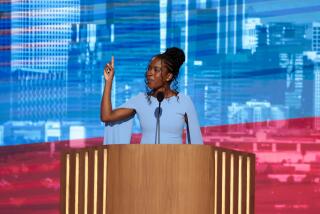The Harvard Book of Contemporary American Poetry <i> edited by Helen Vendler (Belknap/Harvard: $20; 440 pp.) </i>
Poetry today is beyond Modern and what’s labeled “contemporary” has been so for more than 30 years. It is therefore no wonder that critic Helen Vendler was moved to provide the poetry reading public with a “state of the union” in the form of this anthology breezily titled “Contemporary American Poetry.”
Starting with Wallace Stevens, as the traditional link between Modernist (Ezra Pound, T. S. Eliot, William Carlos Williams, Mariane Moore) and present-day letters, Vendler makes her case for a peculiarly “American” poetics represented by the featured poets. Indeed, her opening statement has a Boston Tea Party manifesto-like ring: “This anthology of American poetry will be able to extend its charm only to those who genuinely know the American language--by now a language separate, in accent, intonation, discourse and lexicon, from English. “Her choices for inclusion in this anthology are meant to demonstrate this evolved tongue, as well as the new sources of the epistemological: These poets live in a world that looks to science rather than metaphysics for answers. They also have been buffeted by social and political winds; they swim in the wake of Sigmund Freud, Karl Marx; they are familiar with the rhetorics of advertising and nuclear threat, the rebirth of feminism. They have, nevertheless, staked out personal territory on this volatile map of late 20th-Century consciousness. Many have rendered a region, embodied an area’s style of speech in their verse. (California is the “spare West Coast rituals” of Gary Snyder just as James Wright is “bleak Midwestern speech”) and this phenomenon, rather than demonstrating provincialism, creates for Vendler an expectation of greatness, though only a few poets, Vendler reminds us, make it to greatness each century.
This handful of poets (35) looks like her betting hand for the future, though she notes that her wager is as much on those who will be remembered as notes “in the common music of our century” as those destined to be “major figures.”
The big omissions here would fill another anthology of Contemporary Poetry--Louise Bogan, Charles Olson, Robert Bly, Robert Creeley, Carolyn Kizer, Stanley Kunitz, Denise Levertov, George Oppen, Galway Kinnell, Donald Justice, Ann Stanford, Maxine Kumin, Donald Hall, Philip Levine, James Tate, Norman Dubie, Jon Anderson, Marilyn Hacker, Ai, Leslie Silko, Robert Hass, Heather McHugh, to name some. A good few of those just listed appear in “Singular Voices: American Poetry” (Avon: $9.95), a paperback published last spring by Stephen A. Berg, who edits “The American Poetry Review.” But Berg includes more poets than Vendler does.
Vendler’s reason for including fewer, nothing more than a “sampling,” as she says, of what seems “satisfying”--is so that the reader can “see the poets whole”--unlike other anthologies that offer a stanza or two and a snapshot.
Still, to call this collection eclectic is an understatement. The concessions made to New Age demographics, categories which she delineates herself as “women” (Sylvia Plath, Anne Sexton, Adrienne Rich), “blacks” (Robert Hayden, Michael Harper, Rita Dove), the “dispossessed” (a lonely James Wright), the “counterculture” (Gary Snyder), “homosexuals and lesbians” (Allen Ginsberg, Rich), even Americans opposed to American foreign policy (Robert Lowell, W. S. Merwin) leave the reader shuffling uneasily between expectations. How many parts “common music of the century” to how many parts “major figures” do we actually have here? And would the presence of at least one Hispanic poet, one Native American, one Asian, have given us a surplus of major voices?
One’s sympathies lean to the editor, finding and naming a new “galaxy” of poets is a thankless task and troubled astronomy. Vendler manages not to sound defensive or too portentous in her introduction, perhaps a first in the history of anthologies. She is at her best when discussing the history of formal changes within poems themselves. Her thoughts on endings, (i.e. contemporary release from resounding closure) are illuminating, ingeniously conceived as “a tentativeness of gesture,” a response to society’s pluralism of view.
If her approach runs too often to the overtly sociological, she rebounds easily to pinpoint “the absence of the transcendent” as American poetry’s most haunting loss and enumerates post-modernist strengths in her most intriguing, elliptical style.
One can argue forever about the choices. In the area of younger and medium-young poets we encounter some as unrewarding as Michael Blumenthal and Albert Goldbarth, embarrassing and lackluster respectively; but also are happily reminded of the basis for more than one established reputation: Reading Charles Wright again reaffirms the triumphant power of the lyric poem. Ditto Plath, Rich, Mark Strand, Elizabeth Bishop, Frank O’Hara.
Vendler’s anthology does what most anthologies do: It gives poets and critics more cause for argument--and perhaps provides new insight into which lyrics (outside of Bruce Springsteen’s) can be called truly American.
More to Read
Sign up for our Book Club newsletter
Get the latest news, events and more from the Los Angeles Times Book Club, and help us get L.A. reading and talking.
You may occasionally receive promotional content from the Los Angeles Times.







